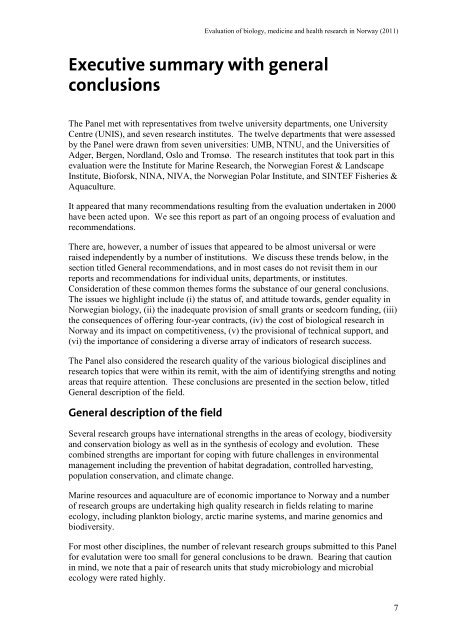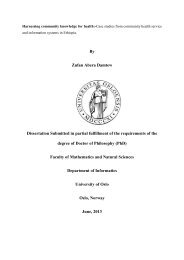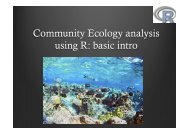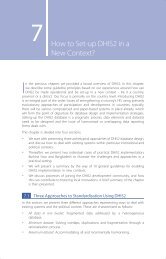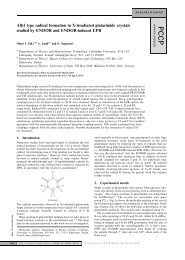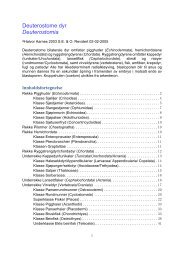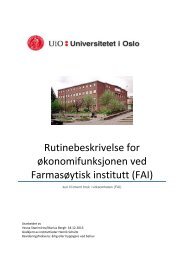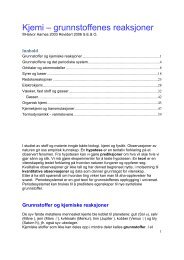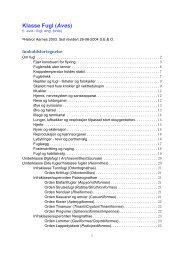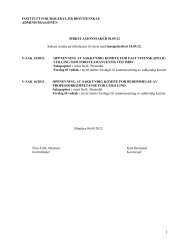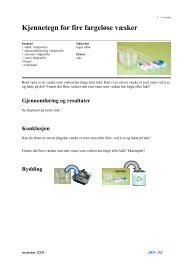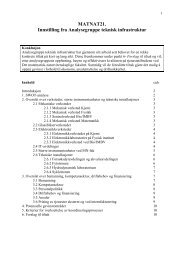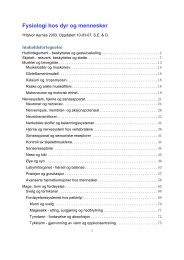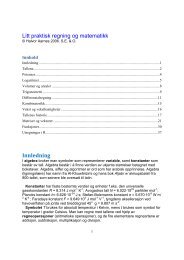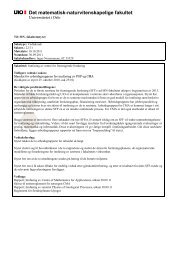Evaluation of individual research units - Norges forskningsråd
Evaluation of individual research units - Norges forskningsråd
Evaluation of individual research units - Norges forskningsråd
Create successful ePaper yourself
Turn your PDF publications into a flip-book with our unique Google optimized e-Paper software.
<strong>Evaluation</strong> <strong>of</strong> biology, medicine and health <strong>research</strong> in Norway (2011)<br />
Executive summary with general<br />
conclusions<br />
The Panel met with representatives from twelve university departments, one University<br />
Centre (UNIS), and seven <strong>research</strong> institutes. The twelve departments that were assessed<br />
by the Panel were drawn from seven universities: UMB, NTNU, and the Universities <strong>of</strong><br />
Adger, Bergen, Nordland, Oslo and Tromsø. The <strong>research</strong> institutes that took part in this<br />
evaluation were the Institute for Marine Research, the Norwegian Forest & Landscape<br />
Institute, Bi<strong>of</strong>orsk, NINA, NIVA, the Norwegian Polar Institute, and SINTEF Fisheries &<br />
Aquaculture.<br />
It appeared that many recommendations resulting from the evaluation undertaken in 2000<br />
have been acted upon. We see this report as part <strong>of</strong> an ongoing process <strong>of</strong> evaluation and<br />
recommendations.<br />
There are, however, a number <strong>of</strong> issues that appeared to be almost universal or were<br />
raised independently by a number <strong>of</strong> institutions. We discuss these trends below, in the<br />
section titled General recommendations, and in most cases do not revisit them in our<br />
reports and recommendations for <strong>individual</strong> <strong>units</strong>, departments, or institutes.<br />
Consideration <strong>of</strong> these common themes forms the substance <strong>of</strong> our general conclusions.<br />
The issues we highlight include (i) the status <strong>of</strong>, and attitude towards, gender equality in<br />
Norwegian biology, (ii) the inadequate provision <strong>of</strong> small grants or seedcorn funding, (iii)<br />
the consequences <strong>of</strong> <strong>of</strong>fering four-year contracts, (iv) the cost <strong>of</strong> biological <strong>research</strong> in<br />
Norway and its impact on competitiveness, (v) the provisional <strong>of</strong> technical support, and<br />
(vi) the importance <strong>of</strong> considering a diverse array <strong>of</strong> indicators <strong>of</strong> <strong>research</strong> success.<br />
The Panel also considered the <strong>research</strong> quality <strong>of</strong> the various biological disciplines and<br />
<strong>research</strong> topics that were within its remit, with the aim <strong>of</strong> identifying strengths and noting<br />
areas that require attention. These conclusions are presented in the section below, titled<br />
General description <strong>of</strong> the field.<br />
General description <strong>of</strong> the field<br />
Several <strong>research</strong> groups have international strengths in the areas <strong>of</strong> ecology, biodiversity<br />
and conservation biology as well as in the synthesis <strong>of</strong> ecology and evolution. These<br />
combined strengths are important for coping with future challenges in environmental<br />
management including the prevention <strong>of</strong> habitat degradation, controlled harvesting,<br />
population conservation, and climate change.<br />
Marine resources and aquaculture are <strong>of</strong> economic importance to Norway and a number<br />
<strong>of</strong> <strong>research</strong> groups are undertaking high quality <strong>research</strong> in fields relating to marine<br />
ecology, including plankton biology, arctic marine systems, and marine genomics and<br />
biodiversity.<br />
For most other disciplines, the number <strong>of</strong> relevant <strong>research</strong> groups submitted to this Panel<br />
for evalutation were too small for general conclusions to be drawn. Bearing that caution<br />
in mind, we note that a pair <strong>of</strong> <strong>research</strong> <strong>units</strong> that study microbiology and microbial<br />
ecology were rated highly.<br />
7


